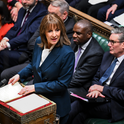Four years ago, Angela Merkel could do no wrong, retiring in a blaze of glory after an apparently stupendously successful 16 years as German chancellor. Then came Vladimir Putin’s invasion of Ukraine and the German economic crash, and she has become the Guilty Woman who paved the way by appeasement and submission.
Merkel’s memoirs, out this week, have harmed her reputation more still because there are no regrets or even question marks about her dealings with Putin. On the contrary, her reply to the charge that Ukraine should have been admitted to Nato in 2008, when instead its membership bid was deferred, is that Ukraine’s admission to Nato would simply have provoked an earlier invasion by Putin.
She is similarly dismissive of the charge of appeasing Putin and exposing Germany by agreeing a second major Russo-German gas pipeline, Nord Stream 2, in 2015, after his first invasion of Ukraine. “I saw it as one of my tasks to get cheap gas for the German economy,” she states boldly, and argues it would have been hard to persuade German business and German voters otherwise, not least because it was part of a plan to phase out nuclear and coal power, strongly supported by German Greens.
In my view, it was probably a mistake not to allow Ukraine to join Nato in 2008, by which point most of the rest of post-Soviet eastern Europe, including neighbouring Poland, Hungary and Romania, were already members, and Putin’s aggressive expansionism was all too clear from his invasion of Georgia. It was also a mistake to make Germany so energy-dependent on Russia, and to have phased out nuclear power, which has the double advantage of being both green and not subject to outside control.
The seriousness of these mistakes is debatable. With the election in 2010 of a pro-Russian president, Viktor Yanukovych, Ukraine may not have joined Nato even if there had been a green light two years earlier. Or had it done so, it might have almost immediately withdrawn. And at the very moment when Yanukovych was ejected in 2014, in a de facto revolution, Putin promptly launched his first Ukraine invasion, occupying Crimea and the Donbas. This was followed by a peace deal guaranteed by the west—giving Putin effective control of his conquests—which most diplomatic observers thought would probably hold.
On energy, the case against Merkel is stronger. Even without Nord Stream 2—which hadn’t entered service by the time of Putin’s second invasion of Ukraine in 2022—Germany was dangerously dependent on Russian gas. And with or without Russian gas, Merkel’s knee-jerk 2011 decision to close Germany’s entire nuclear power sector within a decade, following Japan’s Fukushima disaster, looks worse and worse as a decision, from both a cost and an energy security perspective.
Yet however much Merkel is to blame on these counts, it is striking that the post-2021 Olaf Scholz government has continued in the same groove. This points to a far deeper German consensus which remains unshaken. Scholz is currently fighting an election claiming to be the “anti-escalation” candidate in Ukraine’s Nato-supported resistance to Russia. It’s an even more naïve—or weak-willed—stance than Merkel’s, given the scale of Putin’s escalation. If Donald Trump pulls the plug on US aid to Ukraine, a Scholz-led Germany is certainly not going to be leading a credible European alliance to replace the US.
In coalition with the Greens, Scholz also switched off all Germany’s nuclear power stations when he had the chance to reverse that policy after the 2022 invasion. His energy policy is in total disarray on cost, green and security grounds, and he doesn’t even have Merkel’s excuse of not being able to predict the scale of Putin’s megalomania. German industry is in a desperate state, partly as a result.
The big question in German politics is whether Friedrich Merz, if he wins the German election early next year, takes a radically different course. Will he massively increase Germany’s defence spending, lead Nato’s efforts in Ukraine (either in a continuing war or as the guarantor of a ceasefire), and restart its nuclear power stations? These would be huge decisions to break with the Merkel consensus. And there is a direct read across to his other big challenge—migration—since a further collapse of Ukraine to Russia would lead to millions more refugees.
As for Merkel, her handling of Russia was but one part of a European statecraft focused on deepening and widening the European Union which, taken as a whole, still appears largely successful. If Europe ultimately weathers the Putin, Trump and Xi Jinping regimes, and the crises of migration and growth, it will be in no small part because it managed to maintain enough unity, democracy and shared prosperity across a continent of more than 40 states.
For 16 years, Angela Merkel was Europe’s effective leader, with German power largely channelled in a constructive, unthreatening manner through the EU. Merz, if he becomes chancellor, needs to fill her shoes in that huge respect—if not in others.













